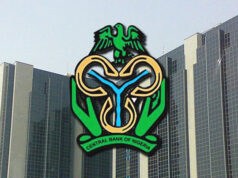The Central Bank of Nigeria (CBN) has raised the Monetary Policy Rate (MPR), which measures interest rate, from 13 percent to 14 per cent.
The latest development was disclosed by the CBN Governor, Godwin Emefiele, while speaking to newsmen on Tuesday after the 286th meeting of the Monetary Policy Committee (MPC) held in Lagos.
He said the hike in interest rate would help tame rising inflation.
The MPR is the baseline interest rate in an economy while every other interest rate used within such an economy is built on it.
Emefiele had in May 2022 disclosed that the CBN Monetary Policy Committee voted to raise the MPR from 11.5 per cent to 13 per cent.
The CBN Governor, who made the disclosure while briefing newsmen at the end of MPC’s 285th meeting at the apex bank’s headquarters in Abuja, said six out of the 11 members of the committee voted to raise the key rate.
He had said the committee also voted to retain the asymmetric corridor at +100 and -700 basis points around the MPR, as well as Cash Reserved Ratio (CRR) at 30 per cent.
Emefiele said the parameters were retained to contend the rising trend of inflation in the country.
“MPC noted with concern the continued aggressive movement in inflation even after the rate hike at its last meeting and expressed its unrelenting resolve to restore prices stability, while providing the necessary support to strengthen our fragile economy.
“As regards the decision as to whether to tighten, loosen or hold, members were unanimous and so did not consider both loosening and retaining rates at the existing levels at this meeting.
“This is because loosening will worsen the existing liquidity condition in the economy and further dampen money market rates necessary to stimulate savings and investment.
Buhari orders Education Minister to resolve ASUU strike in 2 weeks
“Members also felt that loosening will trigger the weakening of the exchange rate which could pass through to domestic prices.
“MPC did not also consider holding rates constant because a hold stance will suggest that the bank is not responding sufficiently to both the global and domestic price developments as inflation numbers continue to trend aggressively upwards.
“And as regards tightening policy stance, members were unanimous that given the aggressive increase in inflation, coupled with the resultant negative consequences, particularly on purchasing power of the poor as well as retarded growth, there is the need to continue to tighten,” he said.
Emefiele, however, said that the policy dilemma was hinged around the level of tightening needed for inflation without dampening manufacturing output which could result from the higher cost of borrowing.
The CBN governor also said that aside narrowing the negative real interest rates down, members were also of the view that tightening would signal a strong determination of the bank.
This, he said, would also help to aggressively address its price stability mandate and portray the MPC sensitivity to the impact of inflation on the vulnerable households and the need to improve their disposable income.
- ‘It’ll worsen suffering’: NLC demands cybersecurity levy reversal - May 7, 2024
- 16-year-old boy: How I sold my kidney for N880,000 - May 7, 2024
- SERAP gives Tinubu 48hrs to reverse 0.5% cybersecurity levy - May 7, 2024










